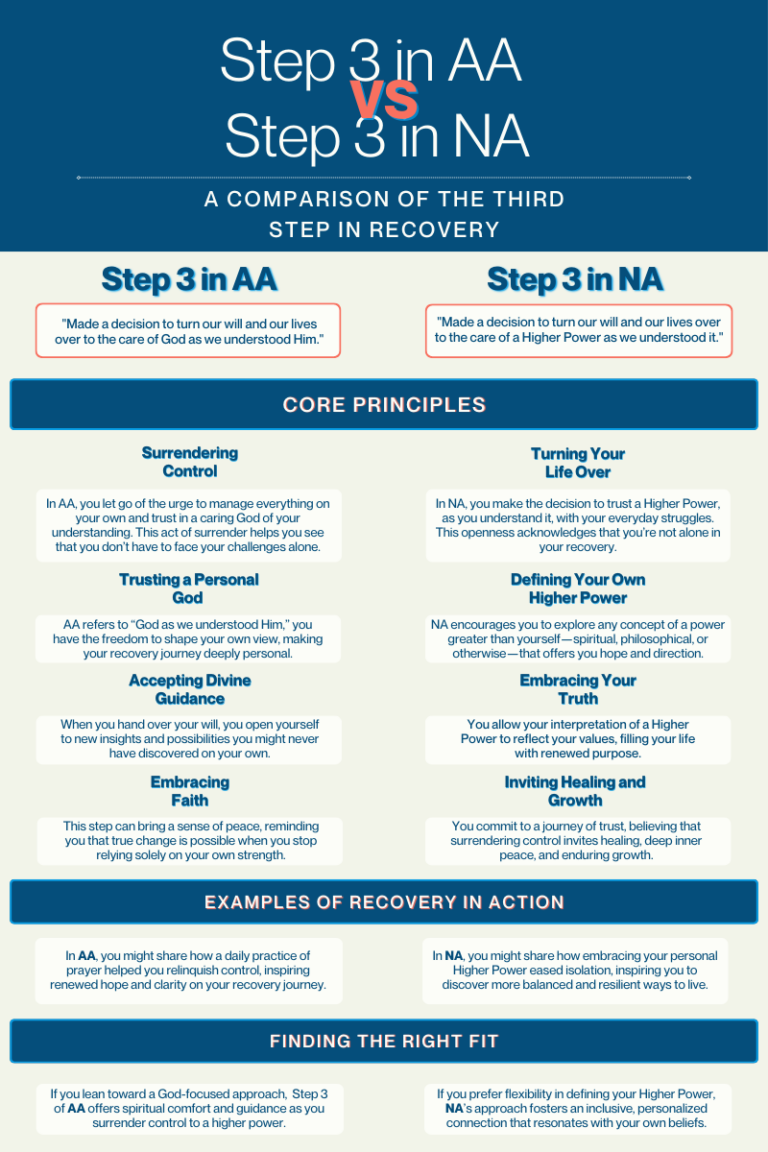Step 3 of AA and NA is where you choose to stop fighting alone.
After admitting powerlessness in Step 1 and finding hope in Step 2, this step asks you to make a brave decision: Let go and trust that something bigger than yourself can guide you toward healing.
Staying sober isn’t just about religion or personal control; it’s about understanding that you can rely on support beyond your strength.
Begin Your Healing Journey Today at Cornerstone!
Explore our residential, outpatient, and virtual addiction treatment programs at Cornerstone.

What Is Step 3 of AA and NA?
Step 3 of AA reads:
“Made a decision to turn our will and our lives over to the care of God as we understood Him.” 1
Step 3 of NA reads:
“Made a decision to turn our will and our lives over to the care of a Higher Power as we understood it.”( Page 44-48) 2
The terms “God” or “Higher Power” aren’t about religion—they represent whatever gives you strength, whether it’s a recovery group, loved ones, or the quiet voice inside saying, “I don’t have to do this alone.”
This step is the brave choice to stop fighting in isolation, trusting that healing begins when you surrender the illusion of control.
Why Surrendering in Step 3 Matters
Holding onto control often keeps people stuck in addiction.
Surrendering in Step 3 of AA and NA isn’t weakness—it’s courage.
When you let go, you create space for:
- Trust: Believing that recovery is possible, even when it’s hard.
- Freedom: Breaking the cycle of trying (and failing) to “fix” yourself alone.
- Growth: Preparing your heart for the deeper work ahead, like when you have to take an honest, hard look at your past in Step 4.
Common Challenges in Step 3
Step 3 asks you to surrender control—a leap that can feel terrifying if you’ve always trusted only yourself.
Many struggle with a fear of the unknown, resistance to the idea of a higher power, or guilt over needing help.
- Fear: “What if I fall?” → Surrender is trusting the ground will catch you.
- Resistance: “I don’t believe in ‘higher powers’” → Yours could be friends, a group, or your own hope.
- Guilt: “Asking for help is weak.” → Letting go is a strength. You’re choosing healing over pride.
This step isn’t about perfection. It’s about saying, “I don’t have to fight alone.”
Quick Tip: Letting Go and Trusting the Process
What helps? Talk to someone who’s been there. A sponsor, a friend in recovery, or even writing in a journal can remind you: Surrender isn’t about losing—it’s about making room for hope.
How to Practice Step 3 Daily
To really embrace Step 3 of AA and NA fully, here are some things you can try:
- Start small: Let go of little things first, like asking for help with a tough decision.
- Use the Serenity Prayer: “Grant me the serenity to accept what I cannot change…” It’s a mantra for releasing control.3
- Lean on your group: Your “higher power” might be the person next to you at a meeting who says, “I get it.”
- Reflect quietly: Spend 5 minutes a day just breathing and repeating, “I don’t have to do this alone.”
Step 3 of AA vs. NA: Small Differences, Same Goal
Both Step 3 of AA and NA share the same wording, but their approaches can differ:
- AA sometimes ties “higher power” to spirituality, but it’s still your choice.
- NA openly encourages you to define it however it works for you, like trust in the group itself.
Both remind you that your higher power is about what helps YOU heal.
Below, You Will Find An Illustrated Breakdown Of Their Differences

What Comes After Step 3?
Step 3 involves surrendering control and trusting that something greater than yourself—whether it’s a recovery group, a spiritual belief, or the love of those around you—can guide your healing.
It’s not about giving up; it’s about finally letting in the help you deserve.
This step asks you to replace old habits of self-reliance with courage: “I don’t have to fight this alone.”
How Step 3 Leads to Step 4
Surrendering in Step 3 isn’t an ending—it’s the foundation for what comes next.
By learning to trust your higher power or support system, you build the courage to face your past without shame in Step 4.
Think of it like this:
- Step 3 of AA & NA is handing over the keys and saying, “I don’t have to drive alone.”
- Step 4 of AA & NA is finally opening the trunk to sort through what’s been rattling around for years—old resentments, fears, and regrets.
Trusting others in Step 3 teaches you to trust yourself in Step 4.
It’s not about perfection—it’s about realizing you’re strong enough to confront hard truths because you’re no longer carrying them alone.
Remember, surrendering isn’t weakness; it’s the quiet strength that lets you heal.
Frequently Asked Questions
What is Step 3 in AA?
Step 3 states: “Made a decision to turn our will and lives over to the care of God as we understood Him.” This means choosing to trust something bigger than yourself—like a group, spiritual force, or personal values—to guide your recovery. It’s not about religion but the willingness to let go of control and believe healing is possible with support.
Do I have to believe in God for Step 3?
No. Your “higher power” can be anything that gives you strength, like a recovery community, nature, or the love of friends and family. Step 3 is about trusting something beyond your own willpower, not following a specific faith.
How do I practice Step 3 daily?
Start small: Let go of trying to control outcomes, ask for help when stressed, or repeat the Serenity Prayer. Surrender isn’t a one-time act—it’s a daily choice to trust your support system and focus on what you can change.
What comes after Step 3?
Step 4 follows: “Made a searching and fearless moral inventory of ourselves.” Step 3’s surrender prepares you for this by building trust in the process. Letting go of control makes it easier to honestly reflect on past behaviors without shame.
Key Takeaways
- Key Takeaways
- Step 3 is about surrender, not weakness.
- Your “higher power” is personal—defining it, however, helps you heal.
- Daily practice (prayer, reflection, asking for help) strengthens trust.
- Step 3 lays the groundwork for deeper self-reflection in the next steps.
Embrace Recovery Today at Cornerstone
Step 3 of AA or NA is where hope becomes action—a choice to trust that healing grows when you stop fighting alone.
At Cornerstone Healing Center, we treat the whole person: mind, body, and soul.
Our blend of evidence-based therapies, one-on-one counseling, and group counseling works hand in hand with the 12 Steps, helping you connect with a sponsor or build your support network.
We don’t just teach recovery; we walk it with you, encouraging you every step of the way.
Ready to breathe lighter? Let’s take the next step together!






